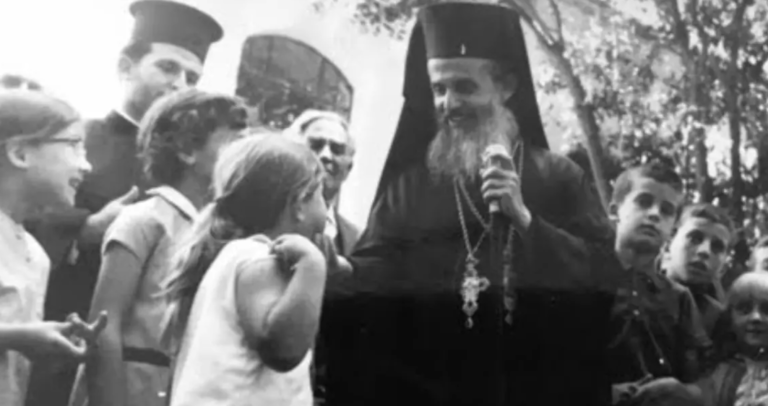Thursday marks 40 years since the blessed repose of a contemporary saint: St. Callinicus, the Metropolitan of Edessa, Pella, and Almopia. The Ecumenical Patriarchate canonized him in 2020, and his feast day is August 8.
Saint Callinicus was born in 1919 in Sitaralona of Thermo, in central Greece, and spent the first part of his life in Thermo and Missolonghi. His parents were named George and Catherine.
According to the Athonite monk Theologos the Ivirite, cited by Metropolitan Hierotheos Vlachos, St. Callinicus of Edessa recounted during a visit to Mount Athos that his grandmother, who was a priest’s wife, would wake him at midnight to do prostrations, and their house hosted travelling monks. His grandfather, Athanasios, was “a priest adorned with holy dignity, who was ‘wounded’ by the life of the Holy Mountain.”
Testimonies collected by the Metropolitan of Nafpaktos from the Saint’s college classmates show that, even during his studies in Athens, he was “a lamb without guile of Christ,” wholly devoted to “prayer and good deeds,” “such a beautiful soul.”
During the war, he served his military duty as a missionary behind the front lines, preaching in churches.
He was tonsured a monk, ordained a hierodeacon, and subsequently a hieromonk in 1957 at Myrtia Monastery.
Elected Metropolitan of Edessa in 1967, at his enthronement, he said that “the inheritance of a bishop is not the throne, but the cross. The bishop is the first to ascend Golgotha.” Every hierarch is “a bearer of the martyrical priesthood of Christ,” added the Saint, according to Metropolitan Hierotheos Vlachos of Nafpaktos, who knew him well.
A Sacrificial and Spiritual Figure
At synodal meetings, “he participated either with a word full of discernment or with eloquent silence, but especially with inner prayer. He supported the positions he considered right, regardless of their advocates,” related Metropolitan Hierotheos.
“At one point, after a difficult session of the Holy Synod, he wrote to me: ‘One thing I see: unfortunately, we seek solutions to our problems from men and forget that no one loves us and cares for us more than God. From no one else does our salvation come. Let us love Christ, and He will arrange the rest… Please, kneel and pray to the Founder of the Church to help your bishop for His Church.’”
After a long period of service, in 1984, he was diagnosed with a brain tumour, and after seven months of suffering, he gave his spirit into the hands of the Lord.
When he was on his hospital bed, “he was vigilant even in the deepest sleep, because, according to the testimony of St. Sophrony of Essex, who visited him at the hospital in London, the defining trait of a true monastic hermit who has the prayer of the mind in the heart is deep vigilance,” writes the Metropolitan of Nafpaktos.
Source: Basilica.ro / Photo source: Mystagogyresourcecenter.com

